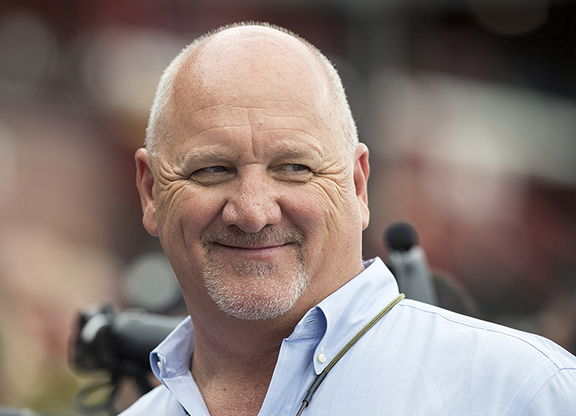By Bill Finley
More so than perhaps any top trainer in the sport, Ken McPeek is always thinking outside the box. And he's at it again. McPeek is in the midst of a three-day excursion to Argentina, where he is shopping for yearlings.
It's not at all uncommon for American trainers to buy yearlings overseas, but to do so in the Southern Hemisphere is largely unchartered territory. That's because Southern Hemisphere horses are born primarily in the months of August, September, October and November. For U.S. racing purposes, they turn a year older every Jan. 1, meaning they will be considered 2-year-olds when they may be no more than 13 or 14 months old. It's a huge disadvantage for a young horse, and one they may not be able to overcome until they are into their 4-year-old season.
“These are horses you have to be very patient with,” McPeek acknowledged.
This isn't the first time McPeek has shopped for young horses in South America. He bought Einstein (Brz) (Spend a Buck) as a yearling at auction in Brazil in 2003. Trained by Helen Pitts and managed by McPeek, Einstein, who made his debut in the fall of his 3-year-old year at Keeneland, went on to win five Grade I stakes and earn $2.9 million.
He came back all these years later in part because of the strength of the U.S. dollar in relation to the Argentine peso. One U.S. dollar equals 101.72 pesos.
“The U.S. dollar is extremely strong right now against the Argentine peso, so there could be some real value buys,” McPeek said. “The dollar is so strong that it is a buyer's market.”
There are no major yearling sales at this time in Argentina. Instead, McPeek has been going from farm to farm looking to buy horses privately. He says that is a common practice in Argentina. He plans on visiting six farms before returning to the U.S. Thursday.
“We are looking at all the top breeding farms down here,” he said Monday. “We haven't decided yet what we're going to buy, but today I looked at over 100 yearlings. Some of the farms we are looking at, they have horses with extremely high-quality pedigrees.”
As of Monday, he had yet to decide how many horses he was going to buy or how much he was going to spend. Much of that would depend on how many horses he saw that checked enough boxes.
“If I see a horse that is what I call a 'wow horse,' a horse that could run anywhere, then we'll ask for a price,” he said. “We'll see if where they value the horse matches where we value the horse. If the market meets you do business. If it doesn't, it doesn't. Einstein was an exceptional horse. That's what we are looking for over here, exceptional horses.”
McPeek said it will cost between $10,000 and $15,000 per horse to ship them from Argentina to the U.S. Once they arrive, the process will begin and McPeek will not be in any hurry.
“You just have to take your time with these horses,” he said. “They won't start to be prepared until next fall in U.S. When they begin racing they're going to be about six months behind the curve age-wise. They're going to have to start out running against horses that are older than them. What I have found is that a good horse can handle that and an average one can't.”
In time, the Southern Hemisphere horses will catch up.
“The added time you'll have to give them will cost you more, but you also get good value as opposed to overpaying for a horse at the 2-year-old sales,” McPeek said. “If these horses are meant to be stakes horses they'll be stakes horses. If they're meant to be claimers, they'll be claimers.”
McPeek was among the first U.S. trainers to send horses to Europe to race. He went against conventional wisdom with Swiss Skydiver (Daredevil) throughout her career, running her twice against males and winning the GI Preakness S. with her. There are numerous examples of him proving you don't need to spend seven figures to come up with a star at the yearling sales. He's not afraid to throw a 70-1 shot into a big race, which is how he won the 2002 GI Belmont S. with Sarava (Wild Again). Now he's buying Southern Hemisphere yearlings.
“I believe a good horse can be found anywhere,” he said. “Sometimes you have to go extra lengths to find them.”
Ha sido un gran placer volver a visitar Firmamento . ¡¡Gracias!! https://t.co/rsSLPvgZaB
— Kenny McPeek (@KennyMcPeek) December 15, 2021
Not a subscriber? Click here to sign up for the daily PDF or alerts.






